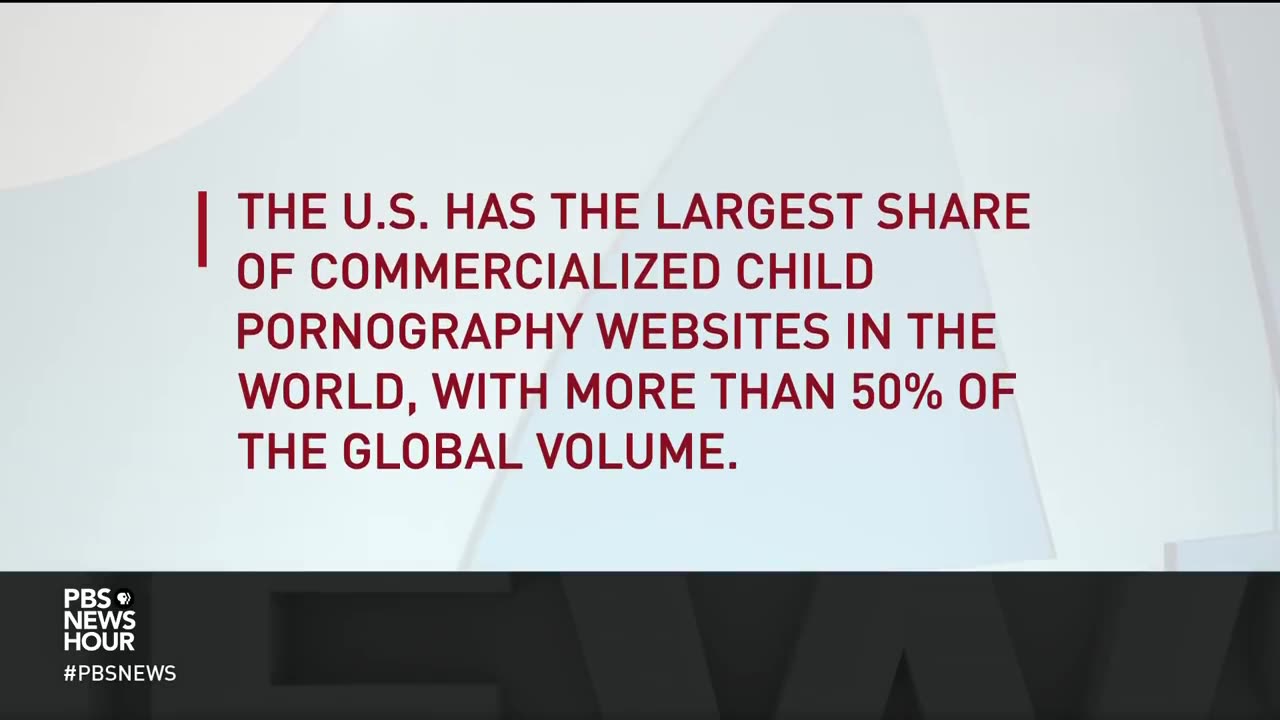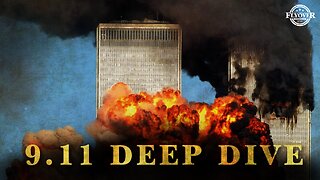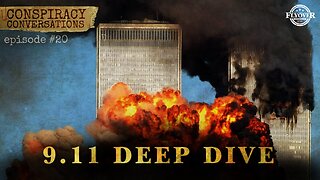Premium Only Content

PBS Report On Child Pornography (Read Description Below For Additional Info Tied To Title)
Help support the channel:
Zelle email: t.brown.hattrick (At) Gmail (dot) com
https://www.paypal.com/paypalme/TheRealTimBrown
Grab This Bucket Of Heirloom Seeds & Get Free Shipping With Promo Code TIM: https://heavensharvest.com/collections/seed-kits/products/heirloom-vegetable-seed-bucket?variant=34283425333292
Protect Yourself From 5G, EMF & RF Radiation: https://www.emfsol.com/?aff=ctQ9GqtsMfLBD3XJZ
Build Your Own Food Forest & Save 5% With Promo Code TIMBROWN: https://shop.foodforestabundance.com/TIMBROWN
Stockpile Food For The Future: https://mypatriotsupply.com/?rfsn=5131805.ffe1a3
Stockpile Your Ammo & Save $15 On Your First Order: https://ammo.com/i/aGRNd0wwRGwxTFE9c
Save Up To 66% Off MyPillow with Promo Code TIMBROWN: https://www.mypillow.com/sonsofliberty
Get A Great Deal On A Satellite Phone: https://satellitephonestore.com/?affiliate=liberty
Gain Cell Phone Freedom With Volta Wireless and Get Your First Month For Just $9.99 With Promo Code USA1: https://www.voltawireless.com/
One Simple Way To Detoxify: https://timbrown.thegoodinside.com/pbx-trial-offer-557846
The following was posted where I originally captured the video above.
I Was Raped By Politicians, Your Fathers Your Mother Other Family Members and U.S. Government Is Selling My Photos XXX Child Pornography (also called CP, child sexual abuse material, CSAM, child porn, or kiddie porn) is pornography that is unlawfully to some and not-unlawfully to other global elite who exploits children for sexual stimulation. It may be produced with the direct involvement or sexual assault of a child (also known as child sexual abuse images) or it may be simulated child pornography. Abuse of the child occurs during the sexual acts.
Biden Daughter’s Diary Details How Washing Dad Privet Parts w/Soap and C*m Mix and I Think Its ‘Not Appropriate Now’ Showers with Joe Biden As A Child I Did Not Know About Sex Yet and She Said Was I Molested. I think so National File has obtained what a whistleblower has identified as a copy of the complete diary of Ashley Blazer Biden, the 39-year-old daughter of Democrat presidential candidate Joe Biden, dating from during the 2020 presidential campaign. National File also knows the reported precise location of the physical diary, and has been told by a whistleblower that there exists an audio recording of Ashley Biden admitting this in her diary. In the diary, which our source says belongs to the former vice president’s daughter, the author writes of her struggle with drug abuse. Ashley Biden’s struggle with drugs was widely publicized. Ashley Blazer Biden, the 39-year-old daughter of Democrat presidential candidate Joe Biden, has allegedly documented incestuous and sexual abuse. National File has exclusively released the full 112 pages of her diary, which was started while she was in a drug rehabilitation facility in Florida and details her romantic interests, crumbling marriage and struggle with drug and sex addiction.
Biden's Daughter: "He Raped Me"...A copy of the complete diary of Ashley Biden, the daughter of Joe Biden, reveals in excruciating detail, her addiction to sex, which she claims began after having been molested by her father, beginning with inappropriate showers together when she was just a little girl.
False Charges Against U.S. Citizens ALL The Time and U.S. Government FISA-DOJ-CIA-FBI-NSA-DEA always said they found child porn your PC/Computer Every Time! its not clear why every court case so far over 26,000 case have always been charged with possession of child pornography in every case.
U.S. Government FISA-DOJ-CIA-FBI-NSA-DEA Personal always care a thumb drive with child pornography on it. So FISA-DOJ-CIA-FBI-NSA-DEA Personal get a search warrant for your home and pc or computer and plaint evidence of child pornography on your computer and now arrest you as a secret pedophile's with child pornography and they have probable cause to believe you the person committed a cognizable offence and now have evidence you have thousand's pics and video's child pornography by you.
So pre the Freedom of Information Act the new world order year zero after filling a law suite to see all court case files by government and evidence they have 100s thousand's pics and video's child pornography by anyone in government court files....
So W0W Very XXX Funny Pics and Videos of plaint evidence of child pornography on we the people computers. so out of over 6,600 thousands of case of people in jail now on plaint evidence of child pornography. New World Order Yr-0 Found So about 4,864 Court Cases....
W0W All the so called secret pedophiles download all the same pics and all same videos at the same times stamp and all the same dates stamp too from the PC Dates. So Government Personal always care a thumb drive with child pornography on it with date and time stamp for every photo and video on their thumb driver and Personal get a search warrant for your home and pc or computer and plaint evidence of child pornography on your computer and now arrest you with plaint evidence by your own government as you are now a pedophile's with child porn.
So all over the world at the same date and time everyone download all the same pics photos and video.... this very cool and wow how did they do it everyware at the same time ? Or maybe its plaint evidence of child sexual pornography ?
U.S. Government Is Selling Child Pornography and Distributing and Seating Around and Watching Orgy Island Video and Global Elite Having Sex With Kids and Rape Kids and Eating Pizza-Gate Killings and Laughing at We The People... Ha Ha Ha and Child Pornography doesn't require elaborate plans. Sending a photo through the Internet will suffice. Disney Pedophile's Billionaire-Backed Sex Trafficking Cult Partied With Richard Branson on His Private Island and It’s also worth noting that former President Obama vacationed with Branson on Necker Island last year. Moreover, convicted pedophile Jeffrey Epstein had Branson and Bill Clinton listed among his contacts in his “little black book,” and his private island known as “Orgy Island” is less than 40 miles away from Necker Island within the Virgin Islands cluster.
The United States has very tough child pornography laws. Possessing even one image depicting a child engaged in sexual conduct can result in a prison sentence. (It may also be a crime when an adult looks at an image that has been altered to depict a child.) Distributing child pornography is punished more severely than merely possessing pornography.
Defendants can distribute pornography in many different ways. Anytime a person shares nude images of children or images of children engaged in sexual conduct, the person runs the risk of distributing child pornography. This article discusses some of the most common ways to "distribute" pornography.
Allowing another person to physically copy child pornography images or movies constitutes distribution of pornography under federal law. (United States v. Roybal, __ F.3d __, No. 12-30350 (9th Cir. 2013).) So does giving away or selling such images or movies. For example, a person who prints a copy of an explicit image of a child and gives that image to someone else has distributed pornography. Likewise, a person who gives to another person a CD that contains video clips depicting children engaged in sexual conduct has also distributed pornography. Finally, a person who sells sexually explicit images of children has distributed child pornography.
These days, most people who are charged with distributing pornography have shared electronic files and images via the Internet or private networks. Federal courts have determined that allowing another person to copy child pornography through a file-sharing program constitutes "distribution" under federal law. (United States v. Budziak, 697 F.3d 1105, 1109 (9th Cir. 2012).) Similarly, forwarding explicit photos of children via text message (sometimes called "sexting") can be considered distribution of child pornography. Teenagers who have shared explicit photos of themselves or other teens with classmates have been convicted of distributing child pornography. For more information on this crime,
Can merely showing pornography to another adult constitute distribution? At this point, it is not clear under federal law whether merely allowing another adult to view pornography constitutes distribution. Even if the act does not constitute distribution, this does not mean it is not criminal. The person who shows the image could still be convicted of possession of pornography.
Showing pornography to children, however, can result in serious criminal charges. Again, federal law is unclear on whether merely showing a pornographic image to a child constitutes distributing child pornography. However, in many states it is against the law to show children any pornography -- depicting adults or children -- with the intent of seducing a child (this is called child enticement).
Federal law usually applies to cases involving the Internet and child pornography, and penalties are severe (including fines and up to 30 years in prison). Each state also has its own laws prohibiting child pornography, and punishment for violations tends to be similarly harsh. Defendants may be prosecuted under state or federal laws, or both.
Many people who are convicted of child pornography are also required to register as sex offenders. Sex offender registration can make it almost impossible to obtain a job, and some states have imposed restrictions on where registered sex offenders can live.
A criminal record, especially for a sex crime, can make it difficult to obtain a job or a professional license, or even rent an apartment. Of course, these consequences are in addition to incarceration, fines, and sex offender registration. If you are accused of or charged with any offense relating to child pornography, you should talk to a criminal defense attorney. An experienced local attorney can determine whether you have any grounds for dismissal or are in a good position to negotiate a plea. An attorney can help you navigate the criminal justice system and protect your rights.
Before making a request, first see if the information is already publicly available. You can find a lot of useful information on individual agency websites and you can also search across the government for information.
This sex trafficking survivor protects girls from hell she endured. If you had a sister, or a cousin, or a niece, or a daughter and somebody was selling her, wouldn't you want something done about that? One in four women in the United States will become victims of sexual violence. The DOJ-CIA-FBI Secret Pedophile's U.S. Department of Fake Justice estimates there are between 440,500 and 970,500 victims of politicians sex and pedophile's trafficking per year in the United States alone. Emmy Myers, a local survivor of sex trafficking and advocate for victims, is working to change that statistic.
Myers's pimp kept her high pretty much all of the time and used drugs as a way to keep her from protesting the arrangement. Myers was “lucky” in a sense. None of the men she slept with were violent with her. Most of them were respected, successful career-driven men. Most of them had families at home. "This is what surprises America," Myers said. "It's not these big, fat smelly gross guys. It's often very prominent men in the community. The issue isn't just something from a Hollywood movie."
Myers is the founder of Lacey's Hope Project, a Wisconsin-based project she started in memory of a close friend and fellow victim of sex trafficking. While she was fortunately rescued, Myers emphasized this could happen to anyone. Her project's goal is to help raise awareness of modern day slavery by focusing on the signs and dangers of sex trafficking and survivors' healing processes. Listen to her story and learn more. Please help her get the message out!
US Teen Charged Over Child Porn Researched Killing Biden Court A 19-year-old man charged with possession of child pornography and arrested over a van-load of weapons had conducted internet searches related to killing Democratic presidential candidate Joe Biden, according to court documents. Alexander Hillel Treisman was arrested in May after a search of his abandoned white Ford van in Kannapolis, North Carolina revealed several weapons including an AR-15 style semi-automatic rifle, and a canister of explosive material.
The search also found books on bomb making, $509,000 in U.S. currency and drawings of swastikas and planes crashing into buildings, according to the October 6 filing in the U.S. District Court for the Middle District of North Carolina.
The currency was believed to be Treisman's inheritance, officials said in the filing.
Following his arrest, the Federal Bureau of Investigation searched his phone, computers and other devices and found 1,248 videos and 6,721 images of child pornography content, according to federal prosecutors.
Joint Terrorism Task Forces investigators also found that on April 15 Treisman had posted an iFunny meme captioned "should I kill joe biden?" and that between March and May he had conducted internet searches seeking information about Biden's home address, state gun laws and night vision goggles.
He also purchased an AR-15 in New Hampshire and traveled to a Wendy's fast food restaurant within four miles of Biden's home and wrote a checklist note ending with "execute," according to testimony by officers in the court filing, first reported by the Daily Beast on Thursday.
After his arrest the "defendant disclosed that he has an interest in terrorist incidents and mass shootings," and had traveled across the country to buy a variety of firearms, the document said.
Treisman was arrested on May 28 and on September 28 was indicted by a federal grand jury for possession of child pornography, it said. Treisman did not have any prior criminal history. ABC News said it was not clear why Treisman has so far just been charged with possession of child pornography.
Child Pornography Laws - Possession is a Crime If you have child pornography on your computer you have committed a federal crime (and possibly a State crime) by its mere possession. Given the wide scope of spam invasions of most computers and programs that can pop up on your computer from aggressive internet advertisers, this danger is ever present in both the home and work place and the law enforcement agencies encourage the employer to take steps to notify the prosecution assuming such material is found on an employee’s work station.
The statute is seriously enforced by Federal authorities and a person’s reputation can be utterly destroyed by the mere accusation. A few clicks on your mouse and you may face a life changing series of events that will alter your life forever.
It is vital to know and understand the applicable laws. Statutory Basis of Crime: Title 18 United State Code (USC) § 2252 provides the following regarding certain activities relating to material involving the sexual exploitation of minors: a defendant can be convicted of possession of child pornography, in violation of 18 USC § 2252(a)(4)(b) where the defendant
“(4) knowingly possesses one or more books, magazines, periodicals, films, video tapes, or other matter which contain any visual depiction that has been mailed, or has been shipped or transported in interstate or foreign commerce, or which was produced using materials which have been mailed or so shipped or transported, by any means including by computer, if—
(i) the producing of such visual depiction involves the use of a minor engaging in sexually explicit conduct; and
(ii) such visual depiction is of such conduct;
shall be punished as provided in subsection (b) of this section.”
Punishment defined by subsection (b) states “whoever violates, or attempts or conspires to violate, paragraph (4) of subsection (a) shall be fined under this title or imprisoned not more than 10 years, or both.”
Case Law:
In US vs. Ziegler, 456 F.3d 1138, the court dealt with the issue of child pornography on an employee’s workplace computer. Ziegler, the employee, was charged with receipt of child pornography, in violation of 18 USC § 2252A(a)(2); possession of child pornography, in violation of 18 USC § 2252A(5)(B); and receipt of obscene material, in violation of 18 USC § 1462.
Ziegler tried to argue a reasonable expectation of privacy per his Fourth Amendment rights. However, even though his office was locked and his computer was password protected, the court did not provide him protection under the Fourth Amendment. The case the district court relied on for this finding was United States vs. Simons, 206 F. 3d at 399 where anything in, “…the records or fruits of [one’s] Internet use” was considered subject to employer control. A supervisor reviewed “hits” originating from Simon’s computer via the firewall, where no download was involved. [Each photo is a file and hence a “hit.”]
It is important to note that the fact that Ziegler sought to protect access to his computer was irrelevant. The crime was not disseminating the materials. Mere possession of the materials is a crime in and of itself, similar to possession of prohibited drugs, such as cocaine.
Cyber Law is governed by federal law since interstate commerce is involved.
There is no statutory authority on the legal requirement to report child pornography to the FBI or other Federal Agencies. However, there is published an interview in USA Today from 2002 with Michael Heimbach, chief of the FBI’s crimes Against Children Unit. He says you are encouraged to report incidents of child pornography (specifically referring to websites and knowledge of accessed websites by others) to either www.missingkids.com or call 1-800-The Lost which will in turn be disseminated to law enforcement. Law enforcement then is supposed to report the incident to their local FBI Office.
In particular, he discusses employer’s liability in reporting incidents it discovers and says that all incidents of child pornography should be reported to law enforcement since it is a felony charge. He does not state any law requiring anyone to report the information, and neither specifically to the FBI but rather law enforcement in general. It is, as expected, only strongly suggested to do so.
Practicalities:
Since the crime is possession of the material, in and of itself, if one finds oneself staring at such pornography on one’s screen regardless of how it arrived there, one has a problem. And, as seen in our article on Computer Discovery, the history of that product on your computer is not eliminated by closing the program or “deleting” it. The odds are good it remains on your hard drive until erased by additional materials over writing it which may not occur for years or ever.
Further, the fact that you have entered that website is permanently on the records not only of that website but on various servers that give access. Most of that information can be obtained by enforcement agencies.
If you are inclined to view such materials, you are violating the law and facing not only disgrace but prosecution. The FBI does actively prosecute such matters on a regular basis.
But assume you did not seek to have the materials and they suddenly popped up on your screen. Assume it was at work. What should you do?
Most employees will simply close the program and expect that nothing will ever happen and they are probably correct. However, if the machine is a dedicated one to your personal work station and the materials are later discovered, you may find yourself in real trouble. For those companies which move computers around without erasing hard drives, new employees may suddenly be accused of having such materials on their hard drive and an investigation can arise seeking to trace the materials back.
That may or may not be possible. While date and time of entry can normally be discovered, unless the computer was locked away in a room, that alone is not evidence that a particular person opened the program. It is not uncommon for employees to have to review their records to determine who worked where and when during such an investigation, with the FBI at times participating in such investigation.
The problem is not only prosecution, for the FBI will not actually prosecute a case predicated on suspicion. However, such accusations are incredibly destruction to a person’s reputation in the community, can destroy marriages, and can arise during later divorce proceedings and custody battles. It is one of the areas in our culture where mere suspicion can destroy a person’s life.
But if you did not actively seek it out and it pops up, that can also be demonstrated and a good proactive step is to immediately go to your supervisor, advise them what happened, and insist that your report be made part of the record and that an investigation as to how it arrived be undertaken. That should eliminate most dangers to you and even if no such investigation is made, your record will be complete and a possible defense against later claims.
But if you did seek it out and it is on your machine, you face a very dangerous situation. Clearly counseling would be useful since you are breaking the law and should address why you are doing that. Any communication as to what occurred with other than legal counsel or medical advisors is quite possibly discoverable so obtaining legal advice immediately is a very good idea.
“epstein orgy island and the global elite have unfortunately, we´ve also seen a historic rise in the distribution of child pornography, in the number of images and videos being shared online, and in the level of violence associated with child exploitation and sexual abuse crimes. tragically, the only place we´ve seen a decrease is in the age of victims.
This is – quite simply – unacceptable.” Disney Pedophile's Branson Necker Island 40 Miles To Epstein Orgy Island Global Elite https://rumble.com/v2dim5k-disney-pedophiles-branson-necker-island-40-miles-to-epstein-orgy-island-glo.html
-Attorney General Eric Holder Jr. speaks at the National Strategy Conference on Combating Child Exploitation in San Jose, California, May 19, 2011.
Child Pornography - Child pornography is a form of child sexual exploitation. Federal law defines child pornography as any visual depiction of sexually explicit conduct involving a minor (persons less than 18 years old). Images of child pornography are also referred to as child sexual abuse images.
Federal law prohibits the production, distribution, importation, reception, or possession of any image of child pornography. A violation of federal child pornography laws is a serious crime, and convicted offenders face fines severe statutory penalties (For more information, see Citizen's Guide to Federal Law on Child Pornography).
Child Pornography Today - Because the term “child pornography” is used in federal statutes, it is also commonly used by lawmakers, prosecutors, investigators, and the public to describe this form of sexual exploitation of children. However, this term fails to describe the true horror that is faced by countless children every year. The production of child pornography creates a permanent record of a child’s sexual abuse. When these images are placed on the Internet and disseminated online, the victimization of the children continues in perpetuity. Experts and victims agree that victims depicted in child pornography often suffer a lifetime of re-victimization by knowing the images of their sexual abuse are on the Internet forever. The children exploited in these images must live with the permanency, longevity, and circulation of such a record of their sexual victimization. This often creates lasting psychological damage to the child, including disruptions in sexual development, self-image, and developing trusting relationships with others in the future.
The expansion of the Internet and advanced digital technology lies parallel to the explosion of the child pornography market. Child pornography images are readily available through virtually every Internet technology, including social networking websites, file-sharing sites, photo-sharing sites, gaming devices, and even mobile apps. Child pornography offenders can also connect on Internet forums and networks to share their interests, desires, and experiences abusing children, in addition to selling, sharing, and trading images.
These online communities have promoted communication and collaboration between child pornography offenders, thereby fostering a larger relationship premised on a shared sexual interest in children. This has the effect of eroding the shame that typically would accompany this behavior, as well as desensitizing those involved to the physical and psychological damage caused to the child victims. For this reason, online communities attract and encourage new individuals to join them in the sexual exploitation of children.
Pedophile and A Pizza Secret Human Trafficking and Child Sex Ring Evidence - https://rumble.com/v2bbfv2-pedophile-and-a-pizza-secret-human-trafficking-and-child-sex-ring-evidence-.html
The methods many offenders use to evade law enforcement detection have also become increasingly sophisticated. Purveyors of child pornography continue to use various encryption techniques and anonymous networks on “The Dark Internet”, attempting to hide their amassed collections of illicit child abuse images. Several sophisticated online criminal organizations have even written security manuals to ensure that their members follow preferred security protocols and encryption techniques in an attempt to evade law enforcement and facilitate the sexual abuse of children.
Unfortunately, no area of the United States or country in the world is immune from individuals who seek to sexually exploit children through child pornography. The continuous production and distribution of child pornography increases the demand for new and more egregious images, perpetuating the continued molestation of child victims, as well as the abuse of new children.
Victims of Child Pornography - It is important to distinguish child pornography from the more conventional understanding of the term pornography. Child pornography is a form of child sexual exploitation, and each image graphically memorializes the sexual abuse of that child. Each child involved in the production of an image is a victim of sexual abuse.
While some child sexual abuse images depict children in great distress and the sexual abuse is self-evident, other images may depict children that appear complacent. However, just because a child appears complacent does not mean that sexual abuse did not occur. In most child pornography cases, the abuse is not a one-time event, but rather ongoing victimization that progresses over months or years. It is common for producers of child pornography to groom victims, or cultivate a relationship with a child and gradually sexualize the contact over time. The grooming process fosters a false sense of trust and authority over a child in order to desensitize or break down a child´s resistance to sexual abuse. Therefore, even if a child appears complacent in a particular image, it is important to remember that the abuse may have started years before that image was created.
Furthermore, victims of child pornography suffer not just from the sexual abuse inflicted upon them to produce child pornography, but also from knowing that their images can be traded and viewed by others worldwide. Once an image is on the Internet, it is irretrievable and can continue to circulate forever. The permanent record of a child´s sexual abuse can alter his or her live forever. Many victims of child pornography suffer from feelings of helplessness, fear, humiliation, and lack of control given that their images are available for others to view in perpetuity.
Unfortunately, emerging trends reveal an increase in the number of images depicting sadistic and violent child sexual abuse, and an increase in the number of images depicting very young children, including toddlers and infants.
CEOS’s Role - CEOS works to deter and eradicate the production, distribution and possession of child pornography. CEOS attorneys work with the High Technology Investigative Unit (HTIU), the Federal Bureau of Investigation (FBI), United States Attorney´s Offices throughout the country, and the National Center for Missing & Exploited Children (NCMEC) to vigorously combat this growing problem by investigating and prosecuting violators of federal child pornography laws. In addition, CEOS attorneys work with law enforcement personnel to identify and rescue victims of child pornography from continued abuse.
The use of the Internet to commit child pornography offenses has blurred traditional notions of jurisdiction. CEOS maintains a coordinated, national-level law enforcement focus to help coordinate nationwide and international investigations and initiatives.
Furthermore, CEOS attorneys and HTIU computer forensic specialists travel all over the world to conduct and participate in trainings for investigators, law enforcement personnel, and others involved in efforts to investigate and prosecute child pornography offenders. CEOS also designs, implements, and supports law enforcement strategies, legislative proposals, and policy initiatives relating to federal child pornography laws.
Evidence Necessary for a Charge of Child Porn When a person commits the federal crime of child pornography as stated within the federal definition context, he or she usually does so with the specific steps as needed for a possible conviction. Presenting the important evidence within the case to the courtroom is the most important aspect of convicting a person committing these crimes in usual circumstances.
The Need to Define Child Pornography
When a person faces possible charges for child porn, he or she must commit the crime as stated in the federal definition or as according to the state laws regarding this matter. The individual must possess, trade, create or distribute sexually explicit images or video of a person under the age of eighteen either in his or her home, online or in another way. The person may trade through a website that police may track and apprehend others engaging in the same crime. Often, when the police officers become involved, these crimes may include at least one other person if law enforcement is able to catch him or her.
The Necessary Evidence
To charge the person with child pornography, the police must observe some form of evidence to proceed with the case. This necessary evidence usually exists in photos, video files or data on a computer that was once one of these two items. Even erased, corrupted or deleted files are usually retrievable by law enforcement to charge the individual with child pornography crimes. This evidence presented in the courtroom through a prosecuting lawyer is generally sufficient to seek a favorable outlook from the judge or jury panel. However, the defense may have an effective strategy to defend against the charges and evidence presented.
Files containing explicit child depictions in a sexual pose, with another person of any age in a sexual manner or that exposes the privates of the youth constitutes necessary evidence. Generally, these depictions are in file format on a computer with mislabeled names. The images may even hide behind other images for those perusing the computer. It may often take special software to discover the evidence for use in a criminal proceeding against the perpetrator. Depending on the intention of the person that possesses these files, he or she may have a valid defense in the courtroom for these images or video on his or her personal computing device.
Accidental Child Pornography
While the evidence is generally sufficient to pursue criminal charges against the individual, there are valid defenses against such crimes. Often, a valid defense that may have support is the accidental possession of child pornography. This is possible when someone downloads files that have other files embedded inside the folder or within the image. Some pictures have other pictures inside them either as an intentional harm to the individual or due to a virus or trojan infecting the computer. Some movie file may also contain sexually explicit images of all manner to include illegal photos of children.
The Intentional Crime
For charges to remain valid against a person with child pornography on a computer, the individual must intentionally acquire and possess the material. He or she must knowingly obtain explicit files of minors and attempt to receive, trade or distribute these images to others or to his or her own computer. The specific crime requires intentional actions and willful cooperation. Without this in the proceedings, the individual may have a valid defense against child pornography on the computer or another computing device. With little ability to track successfully, law enforcement relies on proving intention within these charges and crimes for conviction.
Defense against Child Pornography and the Lawyer
The most important and primary defense against these charges is a lack of knowledge or intent in acquiring child pornography on a computer. Downloading something with the graphic content attached is and remains a valid defense that the individual may successfully use. It is important to explain that possessing the content was not intentional in any way, and he or she would have deleted the material if knowledge was present. Consulting with a criminal defense lawyer is generally crucial in implementing a strategy
for these crimes.
Hiring a lawyer is often one of the first actions someone charged with possession or distribution of child pornography will accomplish. The lawyer will work hard to protect the rights of the client throughout the legal proceedings and engage in the use of a defensive strategy to defend against the charges to the best of his or her ability.
Child Porn Viewed by Accident – Can I Still Be Charged ? There are numerous situations where a file or idea searched or downloaded will open an image or video of child pornography that is not an intentional action by the user of the computer. When these incidents occur, it is best to contact a lawyer because of the federal charges that are possible when even accidentally opening child pornography files.
The Crime of Downloading Child Pornography
When a person uses the internet, he or she may accidentally run into a file or folder that has child pornography in it or hidden within the code. Some users are aware of this and download the files intentionally with the software or know how to extract the illegal images. Others are fully and completely unaware that anything is wrong with the file or that anything illegal contained in the download exists. In these instances, the crime of downloading may provide a valid defense. However, the law enforcement agencies may still arrest the person for the actual download no matter if it was intentional or not.
Electronic Devices and the Download
No matter what device a person has, it is possible to receive or download images of child pornography because of embedded media or virus or trojan attacks with these images inside. The accidental download occurs when the person attempting to receive or retrieve a valid file receives child pornography as well or in place of the original. These images may remain on the computer as proof, or the individual may delete them immediately either to remove the offensive material or without any knowledge of what was inside the file or folder. In some of these instances, the event of an arrest is a confusing and anxious time.
Many owners of computing devices are able to dodge charges of child pornography when the agency does not monitor the download. However, there are just as many instances where the individual that accidentally downloads and views the file will face criminal federal charges for possession or distribution of child pornography. It is crucial to hire a lawyer to defend against these charges. The fewer files containing explicit graphic images of minors on the computing device, the better the individual may have of supporting accidental download and viewing of the media. It is critical to hire a criminal defense lawyer to support the case of accidental viewing when these incidents occur.
Implementing Defensive Strategies
The individual may still face federal criminal charges of child pornography, but he or she should hire a criminal defense lawyer to both implement and support a case of accidental downloads and viewing. Usually, the accused will only have the images from the one download that will cause the court case. To implement a successful defense, he or she may need to, in detail, explain what happened to lead to the download or images showing on his or he computer. Generally, the legal team will need an expert witness to analyze the computer and explain any virus, trojan or other infection that may pop up child pornography images.
The Incident of Accidental Viewing
Many adults that want to view certain adult material will encounter child pornography on websites that advertise normal or fetish adult material within the pages of the site. Accidental incidents may occur when attempting to view such graphic images or video. The charges often occur when law enforcement investigate IP addresses, check records on websites or confiscate the hardware the individual uses to visit adult sites. The officers will initiate a case against the individual when police believe the person committed the acts intentionally. When charged, the person should hire a criminal defense lawyer immediately.
The Delicate Case and the Lawyer
It is crucial to explain the matter to a lawyer to present the case delicately and appropriately to the courtroom. The judge or jury panel may not look favorably on the defendant because of the subject matter. However, with a convincing argument and evidence to support the defense, it is possible to inform all members of the court. Computer hardware and browser history may also support the case of accidental or unintentional viewing of child pornography.
Legal support may need to quickly build a case to support the corroborating evidence with the computer, internet history and lack of any other evidence than the accidental viewing of the child pornography. The investigation into the matter may not hold sufficient evidence that the perpetrator committed the crimes with intent or was even aware of what he or she saw.
Does Spousal or Marital Immunity Cover Child Porn on My Home Computer ? There are instances where a court will use exemptions to spousal or marital immunity to ensure that one spouse is able to testify against the other when he or she engages in child pornography with a home computer. This provides the court the opportunity to discover the full scope of the problem and if any other culprits are part of the problem.
The Exception
There are many times that the prosecution or civil litigation lawyer may use exceptions to convince one spouse to testify against the other. The courts would need to examine the specific case and circumstances of the matter. If there are certain issues such as possible child pornography and the spouse was aware or knows where the information is, he or she may need to testify to help prosecution put the person away from the crime. Often, the exception will provide the opportunity to testify if the crimes occur with the child of the spouse. Then, the immunity or privilege of a spouse is not in play.
The Child Pornography Case
Cases of child pornography are often severe. The individual on trial will own, distribute, trade or sell images or video of graphic scenes with minors. Usually, the depictions are blatant or suggestive. Additional factors may include seriously young victims, pictures found online through certain websites that provide the data or hacked systems that may possess various pictures or video. An investigation into the matter may provide the prosecution with additional areas of proof or in helping the police or agency in discovering numerous other culprits of the same crime. Then, the prosecution may convince the spouse to forego privilege and testify against the defendant.
Investigations and the Child
The initial investigation into the case that leads to the arrest of the person engaging in child pornography usually uncovers images or video of the crime. However, if the prosecution and police have additional evidence, the investigation may continue until everyone is certain and satisfied that there is nothing else to find. At that point, it is important to determine how to proceed. If the spouse is cooperative with the police, he or she may also cooperate and help with the prosecution. By testifying against the spouse, the individual foregoes spousal or marital privilege and may give testimony within the courtroom.
To assist the police and prosecuting lawyer, the group may show the evidence to the spouse. It is often not necessary to accomplish this if the child affected is within the family or someone that spouse knows. The injuries to the youth may also incite anger and righteous fury with the wife or husband to seek justice for the criminal activity. To could lead to the spouse providing a personal computer, additional hard drives or locations where the romantic partner would hide items. This may also include a storage unit, online access or accounts that hold information or video or camera captures of proof of the crimes.
Inapplicable Immunity
There are instances where the effects of child molestation or forced sexual interactions could lead to the revocation of immunity between spouses. This generally applies to cases where the child of the family is the victim and there is communication between the two spouses about the possible case or materials that may affect the strength of the case against the perpetrator. It is important to consider all factors when there is the potential to admit the testimony of the spouse. The exceptions are not often considered in these cases until the matter arises. It is at the time of the child pornography proceedings that the problem may rise to the circuit court.
Federal evidence law becomes part of the case when determining if the child pornography and any sex crimes affect the spousal or marital privilege. Immunity in these matters may not exist depending on the circumstances. Communications between spouses may lack the immunity of spousal privilege if one spouse harms the other or a member of the family. However, without this, the court may have little recourse in forcing the legal partner into testifying against him or her.
Legal Defense and Spousal Immunity
The spouse will need a criminal defense lawyer, and the other spouse may need to communicate possible immunity factors with the legal professional if he or she does not want to testify against the spouse. The lawyer may need to work hard to determine if immunity will apply or if the court will revoke it.
Defenses to Possession of Child Pornography Possession of child pornography is a serious crime with potential harsh punishments based on state and federal charges. It is common for such charges to involve a federal investigation that turns up multiple forms of prohibited conduct.
Some cases involve celebrities or respected members of the community. Being charged with such a crime can have a significant impact on a person’s professional and personal relationships. However, there may be many defenses that are available to someone facing this type of charge. Some common charges include:
Defendant Is Not in Possession
One common defense is that the prohibited material does not belong to the defendant. This defense may be raised when the content is found on a computer that is shared, such as a work computer. Someone else may download the content and then accuse the defendant of doing it. This defense may also arise if an angry spouse, disgruntled employee or other individual who is after the defendant downloads the content in an attempt to frame the defendant. The person who plants this prohibited conduct may then tip off police as to its existence.
A criminal defense lawyer can help establish this defense such as by having a computer forensic expert show how and when the content in question was downloaded or by establishing that it was not possible for the defendant to download the material.
The Content In Question Is Not Child Pornography
In order to be considered child pornography, the content must meet a specific definition. This content is typically that depicting naked children or sexually explicit content featuring children. If the content does not include children, it cannot be considered child pornography. There is also content that is exempted by the Motion Picture Association of America, such as specific drawings or films. Additionally, content that serves an educational or scientific purpose may not be considered child pornography.
Unintended Possession
Another possible defense to child pornography possession charges is that the possession was not intentional. This defense can arise if someone accidentally receives child pornography through email or accidentally clicking on something on a website. Simply by going to certain websites due to a typographical mistake in the web address can result in such content immediately downloading. A criminal defense lawyer can help establish this defense by showing the limited time that a person spent on a particular website.
Another defense of this nature may arise when the defendant intended to view pornographic material but did not intend to view that depicting children.
Illegal Search
In some cases, the defendant may be able to raise a defense not based on his or her actual innocence but based on procedural errors that were made in the process in violation of his or her constitutional rights. For example, the defendant may be able to successfully argue that the incriminating evidence was illegally seized by police.
This defense may arise if the warrant was illegally obtained because the law enforcement officer who obtained the warrant lied in order to get it. In other situations, police may have went beyond the scope of the warrant, such as by searching locked boxes or computers that were not specifically named in the search warrant.
Psychological Addiction Caused It
This defense may be used to help minimize the sentence that the individual receives if convicted. While this will not usually result in a dismissal of the charges, it may held the defense receive a sentence involving a treatment program instead of incarceration.
Entrapment
Entrapment occurs when police operate a sting operation in which they arrest a person after encouraging him or her to commit a crime that the defendant otherwise would not have committed. Once the defendant completes the transaction to purchase or download child pornography, police arrest the defendant. This defense may arise when the defendant purchases content that was not clearly child pornography or labeled with an ambiguous title.
Legal Assistance
Individuals who are suspected of violating possession of child pornography laws may wish to contact a criminal defense lawyer. He or she can explain the defendant’s rights. Additionally, he or she can discuss defenses that may apply to the case depending on the particular circumstances involved and work to protect the defendant’s constitutional rights.
Internet Sex Crimes Sex crimes are prevalent in each state to varying degrees. Of these, many offenders are convicted of crimes involving interactions through the internet. Some use profiles to capture the attention of specific people, while others create or distribute illegal content such as child pornography.
While many feel safe cruising the internet while believing they are anonymous, many are unaware of just how watched some are when browsing online. Not all internet crimes may be discovered, but those that are may be harshly penalized when convicted.
Accusations Cause Difficulty
Accusations of sex crimes may cause a loss of reputation, social damage beyond repair, ruination of relationships and other related problems. The very accusation may be the foundation for charges in some states, potentially leading to conviction. Accusations of these severe crimes often cause others to lose faith in the accused individual. Some relationships may fail because allegations are believed even though the defendant has not even been convicted. Those in the community the alleged criminal resides in may treat him or her with prejudice based on the accusations alone.
Sex Crimes are an Illegal Activity
Various activities online are illegal. To be an internet sex crime, any activity conducted through use or aided by the internet must be involved. This may include possession or distribution of child images or video of a sexual subject or manner, attempting to entice or encourage a minor’s interactions in a chat room or sending provocative photos or video to a minor. Requesting these may incur additional charges of possession of child pornography as well. These crimes are often complicated with charges at both a state and federal level.
Crimes of Child Pornography
When sex crimes are committed online, these often include charges involving the collection of visual depictions of minors or those that have graphic images of sexual contact or nakedness. Downloading or distributing these images across state lines causes these offenses to be upgraded to the federal level. This may be through server exchanges, transport via routers or even movement with conventional vehicles.
Penalties for these crimes are often harsh with potential additional punishments added on based on the factors of the crime involved. The amount of photos, depictions, age and various similar factors are included in sentencing determination.
Online Inducement and Requests
Luring minors online through enticements with the intent of committing the crime of sexual abuse is a second-degree crime in many states. The minor must be under the legal age of the state, which is usually eighteen. Often prosecution must prove that the perpetrator was soliciting someone under the age of eighteen, some type of attempt was made to entice the youth and intention of committing a crime with the minor was in place. This also involves the use of the internet in the crime.
Penalties through conviction may lead to a prison stay of at least five years. Sex offender registration is a likely possibility if the state requires this. When defending against these charges, the intent behind actions must be proven.
Sex Offender Registration
As with most sex crimes, sex offender registration is required in most states. Any sex offender must register based on the stipulations in the state the crime was committed in and submit various identifying information for the registration. Depending upon the state and crime, registration may be for years or for life. Additionally, sex offenders are often required to register their residence when they move into a new state.
Megan's Law
There are variations of Megan’s Law in every state, but guidelines may differ depending upon certain factors. These guidelines are to administer how the sex offender’s information is permitted for viewing by public individuals. Some states have registration through a database with public access, but others have internet registration accessible only to a few. Notifications of sex offenders are often made available to the community he or she will become a part of.
Some states such as New Jersey have regulations on how sex offenders must adhere. This may require those registered to avoid specific towns or areas that ban those with registration. This may additionally ban special areas where sex offenders with a history of crimes against children might run into such young people.
Finding a Lawyer for Internet Sex Crimes
If accused, it is best to find a lawyer that has knowledge about sex crimes. With internet involvement, the lawyer should be well-versed with how to access and use the internet and how these instances apply to these cases.
Legal Considerations for Child Pornography Cases Few sex crimes bring more negative connotations to mind than those related to child pornography. In our computer age where information, images, and videos can be rapidly and easily accessed, this has become a growing area of concern. Although search engines have become better at filtering out inappropriate materials, it is still possible to occasionally come into contact with these matters, either intentionally or not.
Charges related to child pornography can be devastating to families and careers, even if the charges are unfounded.
Most cases start with a search warrant and a seizure of equipment which may include computers, hard drives, flash drives, discs, DVR systems, DVD players, MP3 players, cameras, smartphones, tablet computers, and anything else that can be used to store, view, or play images or videos. Search warrants can be acquired when a person reports finding child pornography on a computer. The reporting person may be a family friend, a computer technician that worked on the computer, an employer, or anyone who has direct or remote access to the system. In some cases, law enforcement personnel use downloaded peer-to-peer programs to search networked computers for files that include illegal contraband. Police may find accounts and IP addresses when websites posting or promoting contraband images are shut down. Many of these sites, some which are hosted in foreign countries, charge users for access and retain records of users and/or their computer IP addresses. And, of course, computers may be searched if seized incident to an investigation for another crime, such as computer fraud or prostitution if the computer is used to post ads on bulletin board sites.
So, if you are under investigation for child pornography, what should you do? First, do not make statements to police or outside persons or parties. That means no discussion with family or friends regarding the facts of the case. Anything you say can be used to support criminal charges, even if you believe they tend to show your innocence. Exercise your right to remain silent and insist on speaking to an attorney and having him or her present before you will say anything to police.
Do not expect to get your computer equipment back anytime soon. Whatever is on there is there for good and now you have to deal with the consequences. If you need a computer you may wish to replace the equipment and take appropriate steps to prevent any similar problems arising in the future.
Possession of child pornography is a very serious offense. It should not be taken lightly. It can result in either federal or state charges (or sometimes both) depending on the particular facts. Mere possession of child pornography is a felony in most jurisdictions, while dissemination of child pornography is an even more serious offense. Moreover, a person convicted of child pornography charges is usually required to register as a sex offender, a label which will follow him or her for the rest of his/her life.
If you have been charged with possession of child pornography, there are a few distinctions to bear in mind. First, possession of regular pornography is not a crime in most jurisdictions. Only possession of child pornography would be criminal. It requires that you had an intent to possess child pornography. That means the government must prove that you had the intent to possess the image(s) and that you had reason to know of its true content and character.
Second, there are many ways you may have acquired images on a computer. Simply having the images somewhere in the memory of your computer does not prove that you had the requisite intent or knowledge to possess the image. Computers may have many users, files are often cached in memory without your knowledge, etc. That means determining which user may have accessed, downloaded or disseminated contraband child pornography images may be a significant defense issue. Even a one time user of a computer may contaminate its hard drive or cache memory with contraband. That is particularly true for computer systems that share an internet connection such as wireless networks at home.
Additionally, files may also be downloaded blindly without knowing specifically about their content. For example, images may be downloaded by clicking on a link without first reviewing the content of the image being downloaded. This may occur with links found in newsgroups or other internet settings. Images can also be downloaded in bulk where each image is not reviewed before the download. Two simple examples may be when a person downloads multiple images associated with a zip file or by highlighting a series of links for download from file sharing programs. Also, as hacking attacks become more prolific, someone else may take control of your computer through a “backdoor” and use it to find, download, and view child pornography without your knowledge, either to frame you or to hide their own identity.
Third, several states have ruled that a person cannot be convicted of "possessing" child pornography based on merely viewing pornographic images a home computer. Pennsylvania, Virginia, Washington and Wisconsin have had similar rulings on the issue. When an image is viewed on a computer, that image is "cached" by the web browser. That means it may exist on the computer without the person ever making an attempt to download the image. Though the person may have been aware of what they were viewing, they may have been unaware that they were automatically downloaded and saved to his computer, and therefore, didn't "knowingly possess" the pornography as state law requires. Even if the person saw what the site contained and immediately left, the image would have been on their computer and that was deemed insufficient for a child pornography conviction.
Finally, search warrants that are used to seize computers and other equipment with electronic storage capacity may be flawed and unsupported by requisite probable cause. When probable cause is lacking for a warrant, any evidence taken as a result of that unconstitutional seizure may be suppressed and cannot be used at trial. Often search warrants are not sufficiently specific to allow police to seize certain storage devices, but they take them anyway. In such a case, the evidence would not be allowed at trial, as it exceeded the warrant's ability to interfere with your right against illegal search and seizure.
If you have been accused of possession or distribution of child pornography, you should immediately seek the assistance of a qualified, experienced criminal defense attorney. If you are actually guilty of these acts, you may also wish to consider seeking psychiatric assistance to help you overcome these impulses. Unfortunately, whether guilty or not, these charges can be devastating, so it is important to minimize the damage as much as possible by seeking the best possible assistance from professionals as soon as possible.
Statute of Limitations for Child Pornography Statutes of limitations are a set of regulations governing the amount of time after a cause of action arises by which the case must be brought or be barred from being heard by the court.
Statutes of limitations apply to a wide range of cases, including civil causes of actions like breach of contract claims and tort claims. However, statutes of limitations can also apply in the criminal context. These statutes usually run from the date when the offense was committed and last for a certain number of years. If a person committed a crime but the statute of limitations has expired, the prosecution is usually barred from prosecuting the case.
Reasons for Statutes of Limitations
The rationale behind having a statute of limitation is that it allows a judicial body to make a decision within a reasonable length of time. Additionally, statutes of limitations help ensure that cases are brought when the memory of witnesses is fresher and the evidence is more reliable.
Deviations from the Standard Statute of Limitations
In some circumstances, the statute of limitations can be extended past the standard statute of limitations. One such reason for this deviation is when the victim is a minor. Therefore, in cases involving sexual abuse of a minor, the statute of limitations may be subject to an extension based on the child reaching the age of majority.
Guidelines
For many non-capital offenses, the federal statute of limitations is five years from the date when the crime was committed. Some states have shorter statutes of limitations. In this situation, a person who is not charged under state law because the statute of limitations has expired can still be charged under a federal charge with a longer statute of limitations.
In contrast, some state statutes of limitations are longer than a comparable federal charge. Some states have statutes of limitations for three or four years. Others have statutes of limitations for seven years. In some instances, there is no applicable statute of limitations, allowing the prosecuting body to bring forth charges at any time during the defendant’s lifetime.
Criminal Punishments
Child pornography charges are some of the most serious and highly punishable. Maximum sentences may be life sentences. Additionally, criminal penalties are usually higher for second or subsequent offenses than they are for a first offense. However, even first time offenders can face serious criminal punishments. First time offenders of producing child pornography can face punishments under federal law of 15 to 30 years in prison and fines. Being convicted of transporting child pornography can result in a criminal sentence of 5 and 20 years in prison and fines.
When criminal defendants are facing sentencing, a number of factors are considered, including any prior criminal history, the nature of the offense and circumstances surrounding the charge. In child pornography cases, some of the factors that can affect a sentence include whether the images in question are considered violent or sadistic, the number of photos that were produced and whether the minor suffered sexual abuse. Some conditions may result in aggravated charges, such as if the images contained brutal elements or sexually attacked the victim.
When a criminal defendant convicted of a child pornography is released, he or she is usually required to register as a sex offender. There may be additional conditions imposed upon him or her, including not living in a residence with children, staying a certain number of feet away from a school or daycare center and keeping the authorities updated with his or her current contact information.
Legal Assistance
Individuals who are facing charges for child pornography often decide to contact a criminal defense lawyer to protect their legal rights and build a defense. Victims or their families may wish to talk to a lawyer to learn about their rights and about how any statutes of limitations can affect the case. Nuances in statutes of limitations can be complex and require a careful legal analysis.
-
 1:48:36
1:48:36
Right Side Broadcasting Network
13 hours agoLIVE: President Trump Attends the Yankees Baseball Game - 9/11/25
146K24 -
 1:54:32
1:54:32
Badlands Media
7 hours agoBadlands Media Special Coverage - FBI Press Conference on Charlie Kirk's Assassination
121K17 -
 1:06:19
1:06:19
BonginoReport
8 hours agoManhunt Underway for Charlie Kirk’s Assassin - Nightly Scroll w/ Hayley Caronia (Ep.132)
272K214 -
 1:11:42
1:11:42
Flyover Conservatives
16 hours agoStructural Architect Destroys 9.11 Narrative... What Really Happened? - Richard Gage AIA | FOC Show
73.6K13 -
 1:51:14
1:51:14
Precision Rifle Network
11 hours agoS5E1 Guns & Grub - Charlie Kirk's "sniper"
42K12 -
 13:09:12
13:09:12
LFA TV
19 hours agoLFA TV ALL DAY STREAM - THURSDAY 9/11/25
406K93 -
 1:01:56
1:01:56
The Nick DiPaolo Show Channel
8 hours agoDems + Media Killed Kirk | The Nick Di Paolo Show #1792
120K102 -
 1:35:10
1:35:10
LIVE WITH CHRIS'WORLD
10 hours agoLIVE WITH CHRIS’WORLD - WE ARE CHARLIE KIRK! Remembering a Legend
35.2K3 -
 50:24
50:24
Donald Trump Jr.
10 hours agoFor Charlie
395K471 -
 2:05:22
2:05:22
Quite Frankly
11 hours agoTipping Point USA? & Open Lines | 9/11/25
77.3K6